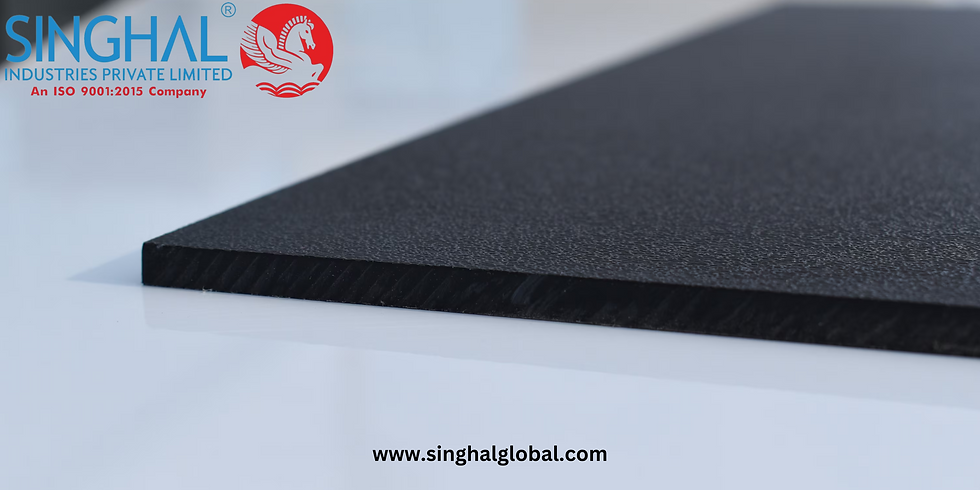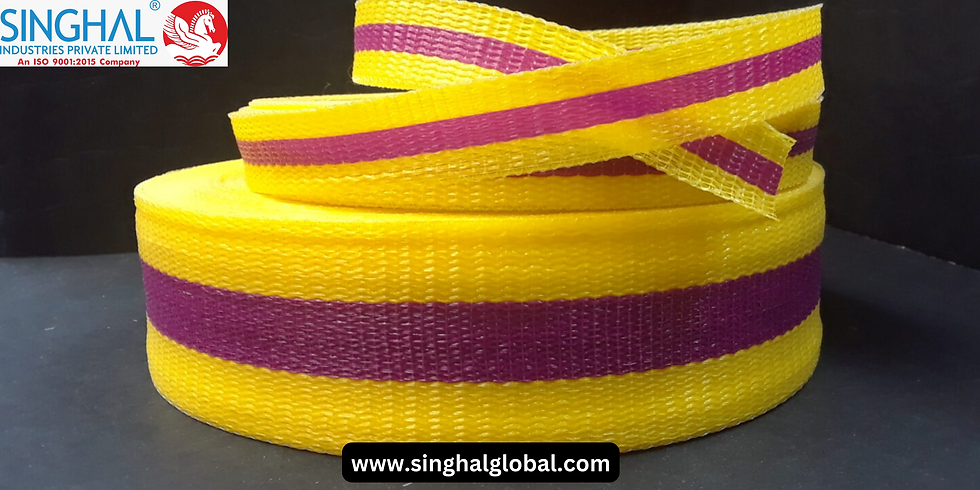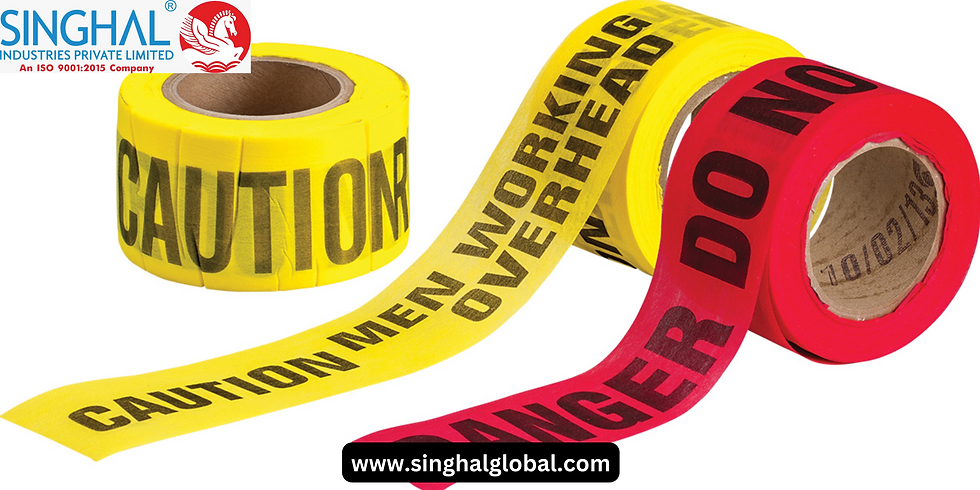HDPE Bags: Strong, Durable, and Eco-Friendly Packaging Solutions
- 1 2
- Jun 18, 2024
- 5 min read
In today’s fast-paced world, the need for versatile, durable, and eco-friendly packaging solutions is more pressing than ever. Singhal Industries, a leading manufacturer of flexible packaging products, stands at the forefront of this innovation with their High-Density Polyethylene (HDPE) bags. Known for their robustness and adaptability, HDPE bags are redefining packaging across various industries. This blog will explore the myriad benefits, applications, and environmental impact of HDPE bags, shedding light on why they are an essential component in modern packaging.

What Are HDPE Bags?
HDPE (High-Density Polyethylene) is a type of thermoplastic polymer made from petroleum. It is known for its high strength-to-density ratio, making it an ideal material for manufacturing bags that need to be both lightweight and extremely durable. HDPE bags are versatile and can be used in numerous applications, from grocery bags to industrial liners.
Key Benefits of HDPE Bags
1. Durability and Strength
One of the most significant advantages of HDPE bags is their durability. They are resistant to tears, punctures, and impacts, which makes them ideal for heavy-duty applications. This strength does not come at the expense of weight, as HDPE bags are remarkably lightweight, facilitating easier handling and transportation.
2. Moisture Resistance
HDPE bags are inherently resistant to moisture, which makes them perfect for packaging products that need protection from water and humidity. This property is particularly beneficial in food packaging, where maintaining freshness and preventing contamination is critical.
3. Chemical Resistance
The chemical resistance of HDPE bags makes them suitable for storing and transporting a wide range of chemicals without the risk of degradation or contamination. This quality is particularly valuable in industrial and medical applications where safety and reliability are paramount.
4. Eco-Friendliness
Singhal Industries is committed to sustainability, and HDPE bags align perfectly with this vision. These bags are fully recyclable, and their production has a lower environmental impact compared to other types of plastic. By choosing HDPE bags, businesses can reduce their carbon footprint and contribute to a more sustainable future.
5. Versatility
HDPE bags are incredibly versatile. They can be manufactured in various sizes, shapes, and thicknesses to meet specific requirements. This adaptability makes them suitable for a wide range of applications, from everyday grocery shopping to specialized industrial uses.
Applications of HDPE Bags
1. Retail and Grocery
One of the most common uses of HDPE bags is in the retail and grocery sector. Their strength and durability make them perfect for carrying heavy items, while their lightweight nature ensures they are easy to handle. Additionally, their moisture-resistant properties keep perishable goods fresh and safe.
2. Industrial Packaging
In industrial settings, HDPE bags are used to package and transport materials that require robust protection. Their chemical resistance makes them ideal for storing chemicals, fertilizers, and other hazardous materials. HDPE bags also serve as liners for large containers, providing an additional layer of protection.
3. Medical and Pharmaceutical
The medical and pharmaceutical industries demand high standards of hygiene and safety. HDPE Plastic bag 50 kg meet these standards with their chemical resistance and durability. They are used for packaging medical supplies, pharmaceuticals, and other sensitive products that require contamination-free storage.
4. Agricultural Use
In agriculture, HDPE bags are used for storing and transporting seeds, grains, and fertilizers. Their ability to protect contents from moisture and pests ensures that agricultural products remain in optimal condition during storage and transport.
5. Waste Management
HDPE bags are also widely used in waste management. Their strength and resistance to punctures make them suitable for handling heavy and sharp waste materials. Additionally, their ability to contain odors makes them ideal for use in garbage bags.
6. Construction
In the construction industry, HDPE bags are used for storing and transporting construction materials such as sand, gravel, and cement. Their durability and resistance to tearing ensure that materials are safely transported without spillage.
Environmental Impact
Recyclability
One of the key environmental benefits of HDPE bags is their recyclability. HDPE is one of the easiest plastics to recycle, and the recycled material can be used to produce new bags and other products. This reduces the need for virgin plastic and helps to conserve resources.
Reduced Carbon Footprint
The production of HDPE bags requires less energy compared to other types of plastic bags. This results in a lower carbon footprint, making HDPE bags a more environmentally friendly choice. Additionally, their lightweight nature reduces transportation emissions, further contributing to environmental sustainability.
Waste Reduction
By opting for HDPE bags, businesses can significantly reduce waste. These bags are durable and can be reused multiple times, reducing the need for single-use plastic bags. Moreover, their recyclability ensures that they do not end up in landfills, thus minimizing environmental pollution.
Singhal Industries: A Commitment to Quality and Innovation
Singhal Industries has established itself as a leader in the flexible packaging industry by consistently delivering high-quality products that meet the diverse needs of their customers. The company’s commitment to innovation is evident in their range of HDPE bags, which are designed to offer superior performance and environmental benefits.
Advanced Manufacturing Techniques
Singhal Industries employs advanced manufacturing techniques to produce HDPE bags that meet the highest standards of quality and durability. The use of state-of-the-art machinery and stringent quality control measures ensures that every bag meets the specific requirements of the intended application.
Customization Options
Understanding that different industries have unique needs, Singhal Industries offers customization options for their Hdpe bags Suppliers. Customers can choose from a variety of sizes, shapes, and thicknesses to ensure that the bags meet their specific requirements. Additionally, custom printing options are available, allowing businesses to brand their packaging for enhanced visibility and marketing.
Sustainable Practices
Singhal Industries is committed to sustainable practices throughout their operations. This commitment extends to their choice of materials, manufacturing processes, and end-of-life solutions for their products. By prioritizing sustainability, Singhal Industries not only meets the demands of eco-conscious consumers but also contributes to a healthier planet.
Conclusion
Hdpe bags price per kg from Singhal Industries represent the perfect blend of strength, versatility, and environmental responsibility. Their wide range of applications, coupled with their durability and eco-friendliness, make them an ideal choice for businesses across various sectors. As industries continue to seek sustainable and efficient packaging solutions, HDPE bags stand out as a reliable and innovative option. Singhal Industries’ dedication to quality and innovation ensures that they remain at the forefront of this packaging revolution, providing products that not only meet but exceed customer expectations.
FAQS
What are HDPE bags made of?
HDPE bags are made from High-Density Polyethylene, a thermoplastic polymer known for its high strength-to-density ratio, making them both lightweight and durable.
What are the primary benefits of using HDPE bags?
HDPE bags offer exceptional durability, moisture resistance, chemical resistance, and recyclability. They are also lightweight, making them easy to handle and transport.
In which industries are HDPE bags commonly used?
HDPE bags are widely used in retail, grocery, industrial packaging, medical and pharmaceutical sectors, agriculture, waste management, and construction.
Are HDPE bags environmentally friendly?
Yes, HDPE bags are eco-friendly as they are fully recyclable. Their production has a lower environmental impact compared to other plastics, and their durability allows for multiple uses.
Can HDPE bags be customized for specific needs?
Absolutely. HDPE bags can be manufactured in various sizes, shapes, and thicknesses, with custom printing options available for branding and specific application requirements.



Comments